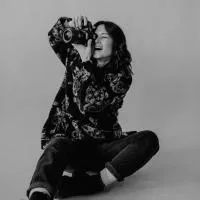Whether you’re just starting a new career in photography, or you’re already an established photographer but are looking to build a new website, it’s critical to take some time to properly plan things out first.
Otherwise, you risk ending up in the same “bucket” with countless other amateurs out there building mediocre sites for themselves.
“By failing to prepare, you are preparing to fail.”
― Benjamin Franklin
If you’re serious about it, dedicating some time to doing research and strategizing in the beginning will really pay dividends in the long run.
Professionals make a plan and then put it into action
As a photographer, you’re both an artist and a business owner.
So you should start acting as a business owner as well (learning to do marketing, web-design, SEO, invoicing, budgeting, etc. – at least to a good-enough level so that you can hire outside help).
I wrote at length about the importance of treating your work as a business in this article, be sure to check it out: You need a photography business plan, not just a website.
Understand your target audience
Clearly defining what your ideal client is and what makes you unique as a photographer can help you build a more effective website.
There are no generic steps that you can follow to find this, it’s all subjective and depends on your goals and personality. But there is a series of (hard) questions I’ve put together to help you describe your audience and form an “elevator pitch” (don’t be off-put by the business terms, it’s easier than you think, and it’s something that you can later put to good use on your new site!)
This should be mandatory reading for all photographers starting a business: How to define your target audience & elevator pitch (and use them on your site)
Research the industry
Your website will not be built in a vacuum. You’ll have to think hard about what products/services you’ll offer and how you’ll position them in the market. Doing some research and getting inspiration from other successful sites in your niche is therefore important.
Here are some questions to get you going:
- Are there other photographers/businesses already that are serving the niche you’re after?
- What services & products are they offering (and how could you do things better)?
- In what interesting new ways could you serve your audience?
- What useful things do other photographers have on their websites that you haven’t thought of before?
Think of the content you already have
Building a website around existing content is considerably easier than guessing what the content will eventually be. That’s because the process is more streamlined and everything gets much simpler.
So make a list of all the bits of content you already have (from any old website, documents you might have sent to past clients, old social media posts, etc.)
Similarly, if you already have a visual identity established, gather everything in one folder on your computer (logo, graphics, fonts, etc.)
Also gather a list of all the services that your web designer might need access too (hosting, domain registrar, site admin, etc.)
And, most importantly, start going through your image archive to find your best images, the ones that you’ll want to showcase on your new site.
Decide on the content you still need to create
Where you’re lacking in terms of content, you need to make a plan for creating it.
That might mean:
- shooting a few personal projects to use in your portfolio (remember that your website is just a multiplier of the quality of your images, they matter most)
- writing your bio
- preparing a few blog posts
- defining your services
- etc.
This is also the time to reserve your domain name, hosting service and social media accounts, if needed.
Writing new content (or preparing new images for your portfolio) is probably the most time-consuming part of it all, but it can’t be overlooked. Everything else sits on top of the quality of your work. Estimate how long it will take you, and double it. (I’ve seen a lot of project delays because preparing content took a lot longer than initially expected).
Sketch an outline of your site structure
Now that you’ve made a list of all the content needed on the site, put it together in a coherent structure. No need to worry about design at this point, just focus on the hierarchy of your site’s pages, on how the content will be organized.
This article walks you through all the steps you need to cover, give it a try:
Define the intangibles
Here is a series of other questions I usually ask photographers at the beginning of a big web-design project. Some of them are optional, of course, but taking some time to answer them for yourself might help you get more insights:
- Are you branding yourself as a solo photographer or as a company?
I wrote about the (dis)advantages of each on the newsletter here. - Any words to describe the mood needed for the site?
People are coming to your new site for the first time. How do you want them to feel about your brand/company/site? (joyful, elegant, classic, serious, funny, dark, modern, minimalist etc.) - Any preferred colors or fonts for the site?
- What do you imagine people using your site for?
What will they want to do there? Why will people choose your site over others? - In order of importance, what are your business objectives with this site, your major goals?
What is motivating you or enabling you to do this project now? - Will you be selling prints and/or image licenses on the site? Any other products?
Examples: Prints, Rights-Managed Licenses, Royalty-Free Licenses, Calendars, Workshops etc. - Who will be working on this project from your end?
Will any additional outside partners or agencies be involved and how? If there are other partners involved, have you synced your schedule with them? Do you have someone who will be responsible for ongoing website updates? Does that person have any experience with website maintenance? - How often do you want or will you need to make updates to your website?
What features do you anticipate adding to your website in the future? - How quickly would you like to start?
- What kind of time frame are we looking at?
Is there a certain event or date that is dependent on this project? Does the project need to be done in phases or with specific milestones or dates? How is your availability for the project? - What is your budget range for this project?
Are you seeing your photography website as an investment instead of an expense? Everything you know about financial planning and budgeting is useful here, of course. - Can you list your top few competitors and their website URLs?
Please try to comment on their strength/weakness and what differentiates your site from them. (If there aren’t clear “competitors”, please list the top sites you would consider similar to you). - Are you worried about anything regarding the project?
What do you imagine going wrong? How can failure be avoided with this project? - What does success look like for this project?
What business metrics are you tracking? What will be the tangible/measurable results for this project? And how will we know if it’s a home-run & we totally knocked it out of the park? What will it mean for you? Ex: 20% increase in site visitors, 5 extra monthly leads/bookings etc.
P.S. Let go of the “build it and they will come” mentality - What is your level of technical expertise? Have you done a project like this before?
Research the tools you need
An important part of your planning process might be to do some research on the tools/platforms you’ll need to build your website.
I won’t give any specific recommendations here (because it all depends on your specific needs), but I’ll soon be compiling a huge list of recommended tours & resources for photographers looking to build their websites.
Till then, feel free to check out my Q&A category or subscribe to my newsletter to be able to ask me anything (via email or by recording an audio question).
Planning is important, but don’t over-think it
Sure, you don’t want to go into a new photography business blindly, but you should also put something out into the world before your internal Resistance takes over.
Spending too much time in the research phase will allow the “analysis-paralysis” mode to kick in. Over-planning is a form of procrastination.
“The reason that everybody likes planning is that nobody has to do anything.” ― Jerry Brown
Instead, you should set a time limit for your research and planning work. Working with a deadline will force you to focus on the essential and get things done.
Plus, you don’t need to define every single detail from the start, you’ll also adapt as you go along.
Conclusion
Planning is what gives you clarity.
And when you’re clear on what you need to do, you can put much more effort and courage into it.
Otherwise, you’re just copying others and hoping for the best. A surefire way to become unremarkable (and therefore unsuccessful) in today’s crowded market.
Follow the guidelines above to plan for a strong online presence for your photography business. Once the plan is set, start working on it with intention.
And if you already have a photography website, planning your future is important as well, but you might first decide if it’s time to redefine your photography business.














